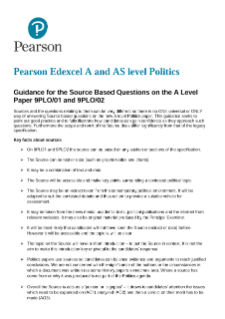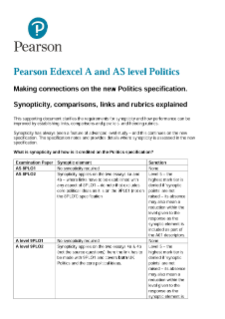Politics
February 2026 Politics subject update
February 2026 Politics subject update
This update contains useful information, news and advice for Edexcel Politics teachers including a new FT for Schools case study on Sir Keir Starmer as PM and the Labour factions plotting against him.
November 2025 Politics subject update
October 2025 Politics subject update
Results Day Summer 2025
February 2026 Politics subject update
November 2025 Politics subject update
November 2025 Politics subject update
This update contains useful information, news and advice for Edexcel Politics teachers including the latest on the Curriculum and Assessment Review and a new FT for Schools case study on US Politics: What will be the impact of the latest US government shutdown?
October 2025 Politics subject update
Results Day Summer 2025
February 2026 Politics subject update
November 2025 Politics subject update
October 2025 Politics subject update
October 2025 Politics subject update
This update contains useful information, news and advice for Edexcel Politics teachers including a new FT for Schools case study on the impact of introducing votes at 16.
Results Day Summer 2025
February 2026 Politics subject update
November 2025 Politics subject update
October 2025 Politics subject update
Results Day Summer 2025
Subject advisor
Mark Battye
Government and Politics

Introducing our Subject Advisor for History and Politics

Introducing Mark Battye, our Subject Advisor for History and Politics. His role is to support you with the delivery of our qualifications, to help you understand the content and the assessment requirements and to answer any subject-specific queries you may have.
Popular topics
This short video explains how to use our website to find the most useful resources and support materials for A level Politics teachers.

This is some general advice from our examiners on the issue of how to approach essay writing and ensuring sufficient evaluation in A level Politics essays.
Pearson Edexcel does not insist or recommend that there is only one form of essay writing in which to frame responses. There are a wide range of approaches and methods all of which are perfectly valid and creditworthy. Essay style and composition does vary from centre to centre and within centres from candidate to candidate – that is borne out in the vast range of scripts we mark. We do not seek common uniformity but instead celebrate the different and unique approaches which we see.
In support material and examiner reports there are some good examples where we try to spell out best practice and give insights in how to maximise mark potential and reflect on the past series of exams.
If you look across the entire Principal Examiner Reports one common theme which emerges is the demand placed on candidates to reach out and gain AO3 marks. This was a fault line across all papers.
AO1 and AO2 presented little difficulty and they have appeared on the legacy specification in a similar format – as such they are not new demands. This does differ when we come to AO3. Unlike on the legacy specification where this was a lesser mark for communication – AO3 is now an equal partner for marks with the other two AOs. It demands that the candidate forms a judgment and reaches a verdict.
It doesn’t matter if the verdict is by a large margin, i.e. there can be no doubt that x is better than y because… or a small one, on balance it can be seen that despite weaknesses, x is still more preferable to y because… but Ofqual and the DfE demanded an outcome be reached. Their rationale was that after two years of study a candidate has to be able to make judgments and to verify and support them. On this basis they gave parity of esteem to AO3 with the other two AOs. It is not a junior partner.
It does not matter how the AO3 is included but it must not be ignored or given scant coverage given its new importance i.e. it must be evident throughout an answer to score highly. We have seen good essays begin with a view in their introduction then continue to argue their view while seeking to explain the other side and why it is negated. This sort of response shows consistency of view from the start of the essay till the end and addresses all three AO’s.
Candidates should not sit on the fence – they have to take sides – the essay can never be a draw. They can construct mini conclusions for each argument and there may be winning and losing arguments on both sides and some may be close but in the long run they have to get to a winning side – an outcome, a verdict, a conclusion to the entire debate. The crucial case is for the candidate to have a degree of reasoned logic in declaring the winning side.
We need an essay that makes a judgement, reaches a verdict and arrives at a well-argued conclusion. It is wise that the conclusion is not a spurious judgement at the end of the essay which we did not expect – it is best if we arrive at that conclusion with credible incremental steps in the essay.
We've made available some exemplar scripts for A level Politics from the Summer 2019 exam series. The exemplars cover every question type from all four papers.
Useful links
-
ResultsPlus
Free online results analysis tool
-
Past papers
Search for past exam papers and mark schemes
-
A level Politics teachers Facebook group
Join A level Politics teachers on Facebook

Find and book events
Find all the latest training and feedback events for Politics.

